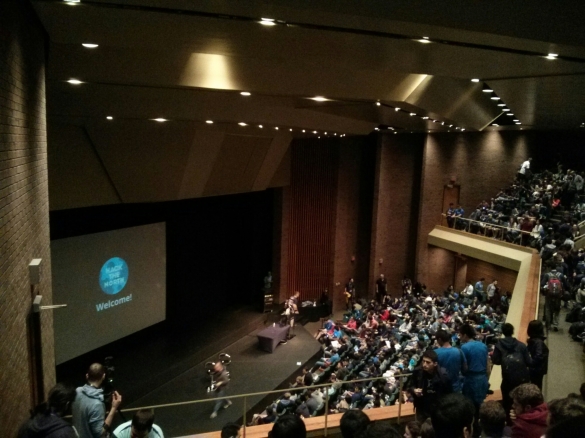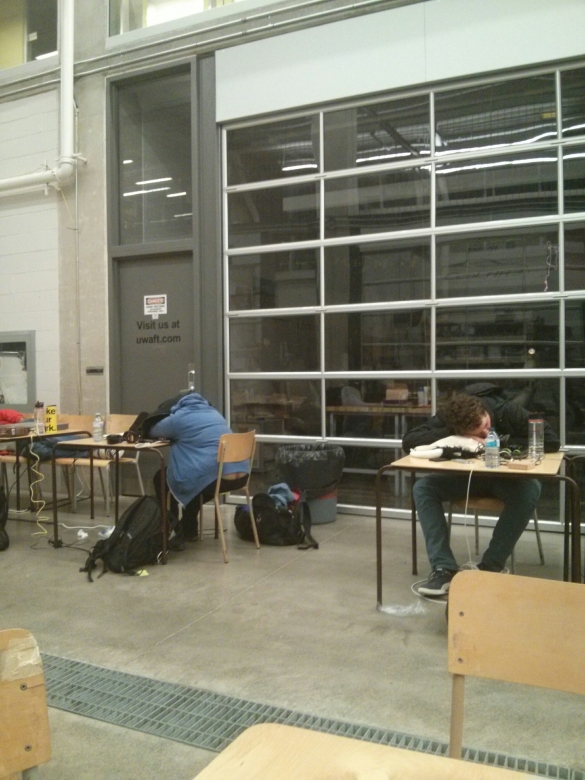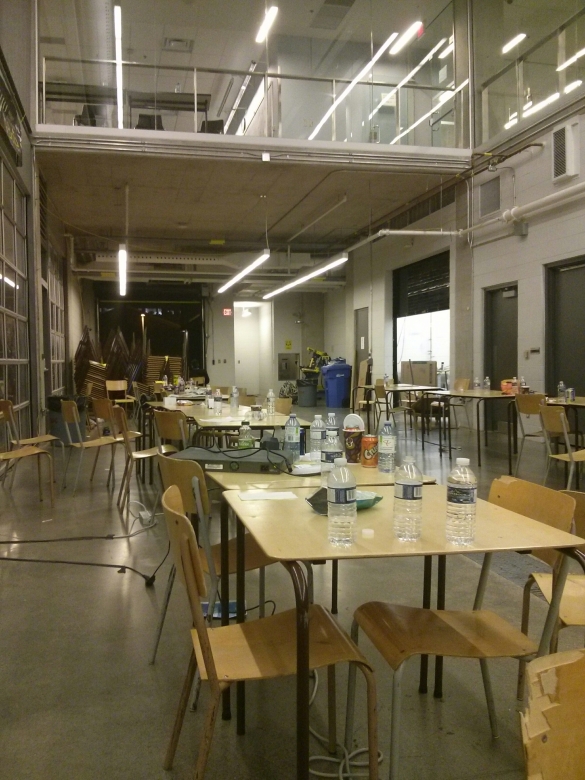Coding has well and truly become a part of my life! I spend my weekdays coding at Axiom Zen as an intern and my weekends either reading up on new tech/languages or heading out to hackathons. How much has changed in a year. I think I used to watch Netflix on the weekends…
It’s Sunday morning and I’ve just gotten back from another student hackathon, DubHacks, which was hosted over 24 hours at the University of Washington in Seattle. It was their first time hosting the event and while there were some growing pains (having dinner at the same time the hacking starts is never a good idea), it was great to see how the movement for student hackers is progressing.
The event was a lot less diverse than Hack the North a month or so ago since DubHacks was a lot smaller, maybe around 300 hackers, and there was only a little money for travel reimbursements. Luckily Seattle is a lot closer to Vancouver than Waterloo, so it was just a 4 hour bus ride. That might seem long by European standards but definitely not in North America!
I went down with a couple of other students from UBC, most of whom I didn’t know before but we had a good old time. I decided to work on a project that I’d been thinking about for a long time but never gotten around to – an app for conducting live polling of an audience. The idea is to have students in a lecture/class or attendees at a conference/presentation answer questions in real-time, thereby keeping them engaged and providing valuable feedback for the speaker to respond to, perhaps diving into an area of identified misunderstanding that needs to be clarified.
If you’re thinking that this would be a problem well solved by something like Node.js which is great for real-time apps, you’d be right. Unfortunately, I’ve been a bit behind on the learning Node front since I’ve moved onto working on front-end dev at work, which meant picking up Angular over the last few weekends. But c’est la vie. I used Rails and jQuery instead since the hackathon was a short one and I wanted to be able to code as much as possible, rather than reading docs (inevitable as it is).
For the real-time functionality, I used Pusher which delivered the messages between server and client – a big thank you to them for providing me with a free upgraded account for the weekend! They made it super easy to integrate with my Rails server and JavaScript front-end.
One other thing to add is that I ended up flying solo for the event.
I decided to work on my own at DubHacks because I thought it’d be a kind of fun endurance challenge (I managed 33 hours without sleep!) to see how much I could build on my own – plus some of my friends couldn’t make the event. I figured it would be a nice change from collaborative coding which while vital to getting things done in the real world, necessarily involves not coding a lot of the time. Don’t get me wrong, working in a team is essential but there’s something fun about being the decision maker and executor. It can be fun to live and die by your own sword – or to put it another way, I just wanted to see what I was made off. Skills I need to continue working on would become more glaringly obvious and help me figure out what to concentrate on the next few months.
For the most part, I pulled it off. My main weakness in web development continues to be design and that’s ok – I’m an engineer after all – on the coding front, my front-end skills are still not at the same level as my back-end but it was nice to see that things are coming along. The app I made doesn’t look half bad at all. The downside was that spending so much time on the front-end and design meant a few bugs in the finally demo-ed app. Super frustrating since I fixed all of them this afternoon (after the hackathon) in an hour, but when you’re sleep-deprived it is hard to think of manual test cases and spot the stupid bugs. I also need to learn more about database design, I think that’s probably something that is hard to from a book and is mostly learned from experience in the real-world. I’m definitely going to ask my co-workers at Axiom Zen how they would have designed the database for my app and see what design decisions I can improve on in the future.
I didn’t win a prize at this event which was disappointing (who doesn’t like being competitive!) but not surprising now that I think about it. My app had small but obvious bugs that took away from the end-product, and wasn’t novel enough to warrant attention amongst the hardware hacks and distributed prime number finders at the event 🙂
Winners of hackathons, I’ve realized, tend to build projects that are technically novel – that would impress other hackers – and while they need to solve a problem, it is not essential to for the problem to be a particularly painful one or for the solution to be readily adoptable. It’s a hackathon not a product-thon if that makes sense. It has to have some value but building cool stuff for its own sake deserves a lot of respect as well. Some of the winners used a Myo, Google Glass and Oculus to control a robot and be able to see the visuals via Skype. Pretty cool.
One other thing I’ve been reminded of at DubHacks is that there is no need to build the core tech itself, at least not at student hackathons. For example, the grand prize winning team didn’t need to build or understand the complexities of the speed reading api that they exported to multiple clients/platforms, it was enough that they got it to work and could put something in the judges’ hands and say, hey this is some cool stuff. Winning Hack the North a month ago, was like that too. We solved a problem using a complex API that neither of us understood (hey, it’s an NP complete problem!) but still created something that was cool.

Good thing the Space Needle is tall and near the bus stop – there wouldn’t have been any sightseeing otherwise!
So what next?
Well, after building a prototype of my live polling application at DubHacks, I still think the problem it tries to solve exists and is one that needs a good/better solution, and so I’m planning to continue developing my live polling app over the next few weeks. It will need to be a complete re-write since the Rails app I made is some of the least DRY (so wet?) code I’ve written in a long time – the number of random script tags and !important CSS tags would be embarrassing in the real world, but hey it’s a hackathon app!
So yeah, definitely going to use it as an excuse, if I needed one, to learn Node and to come up with something more robust. It’s annoying to have to use a technology stack you know is ill-suited to the problem because you don’t quite yet know the alternative. Inspiration to continue learning then. Always keep on learning.
Oh, and here’s the app I built (plus an hour of post-hackathon tidying up of the most obvious styling issues and bugs).




